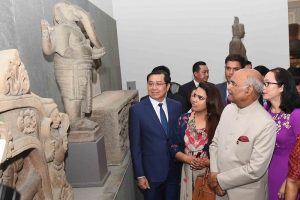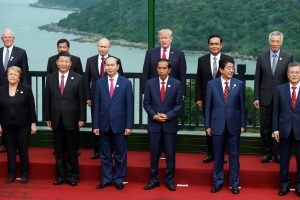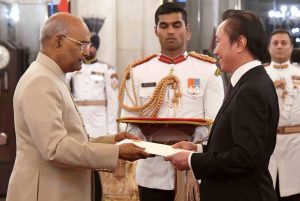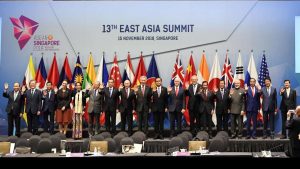
Amid a raging diplomatic debate about the future trajectory of the Indo-Pacific, India and Vietnam are set to intensify their cooperation in shaping a balanced, peaceful and prosperous region during President Ram Nath Kovind’s visit to the strategically located Southeast Asian country.
The talks in Hanoi on November 20 will impart more content and depth to CSP, forged during PM Modi’s visit to Vietnam in September 2016. Besides bilateral cooperation focused on trade and investment and development cooperation, geopolitical and security issues regarding the evolving regional security architecture will be high on the agenda.
With the spotlight on the Indo-Pacific, the two sides are expected to reaffirm their shared resolve to enhance cooperation in in maintaining peace, stability and development in the Indo- Pacific region as well as in the world at large. This position will be reflected in the joint statement and should also find mention in President Kovind’s speech before Vietnam’s National Assembly on November 20.
Contrary to some reports about Vietnam’s unease with the Quadrilateral Dialogue, Hanoi has yet to articulate its position on the dialogue between India, the US, Japan and Australia, which has been seen in China as an attempt to target its rise.
Vietnam’s foreign policy: Three ‘Nos’

Vietnam, an emerging sunshine economy which is expected to grow at the rate of 6.5-7 per cent, has no desire to get entangled in geopolitical games as it conflicts with its larger goal of promote peace and stability in the region, which will provide a congenial atmosphere for its economic aspirations. With this overarching objective on mind, Vietnam has scrupulously followed ‘Three-Nos’ in its foreign and national security policy: no military alliances, no foreign military bases on Vietnamese territory, and no reliance on any country to combat others. In accordance with its doctrine of three NOs, Vietnam is, therefore, not in favour of any military alliance or use of force to resolve disputes, which is not in accordance with international law. Seen in this perspective, Vietnam is carefully observing various plurilateral and multilateral groupings and assessing their role in promoting regional peace and stability. Located in the heart of the Indo-Pacific, Hanoi has special interests in ensuring that the region is free of conflict and geopolitical machinations.

This explains why recent media reports about Vietnam’s opposition to the Quad has created much resentment not only in Hanoi, but also among informed strategic circles in the region. In an interaction with the media ahead of the Indian president’s visit, Vietnam’s newly-appointed envoy Pham Sanh Chau had only reiterated his country’s position in response to questions by Indian journalists about Hanoi’s position on the Quad dialogue. Stripped of spin and rhetoric, his response was merely a re-articulation of Vietnam’s policy of three Nos. “Vietnam welcomes any initiative for maintenance of peace, security, freedom of navigation and overflight in the region,” he had said. “Vietnam does not to join any military alliance, in accordance with its three Nos as it is not conducive to the security environment in the region.”
No zero-sum games
“If any country wants to gang up, use force or trying to use force, then it goes against the position of Vietnam,” he had said. There was no mention of the Quad in the envoy’s speech, but only a rephrasing of Hanoi’s oft-stated position about the need for the region to move beyond rivalries, a point made forcefully by Prime Minister Narendra Modi in his address at the Shangri-La Dialogue in Singapore on June 1. Underlining the centrality of ASEAN in driving the Indo-Pacific, PM Modi had appealed to the region to move beyond great power rivalries. Mr Modi’s focus on an inclusive Indo-Pacific was widely appreciated by diplomatic-political establishment in ASEAN countries, including Vietnam.
Besides, given its growing bilateral relations with all the Quad countries individually, Vietnam has chosen to focus on enhanced across-the-board cooperation in promoting a peaceful Indo-Pacific region. Hence, the spin and interpretation about Vietnam’s alleged opposition to the Quad carries little credibility. What the Quad does is only of interest to Vietnam in so far as how it advances regional peace and security.
India’s Quad Way

Vietnam’s circumspection about any gang-up also accords with India’s rejection of containment and zero-sum geopolitics. Unlike the US and Japan, which can afford to be aggressive in their posturing vis-à-vis China, India and Vietnam, which count China as their biggest neighbour, are more pragmatic in their approach towards Beijing. Although Vietnam is non-committal on the Quad, Vietnam should have no objection to India’s approach towards the grouping which is more focused on promoting the four-nation cooperation in infrastructure and connectivity projects. This came out vividly in India’s statement after the third edition of consultative dialogue among the Quad countries in Singapore on November 15. Compared to the US and Japan, India’s statement was more nuanced and balanced, and spoke about cooperation in connectivity, counter-terrorism and cyber security. If this is the way Quad play out in the future, ASEAN will probably have a greater comfort level with this much-discussed grouping.
Going forward, there is no dissonance between New Delhi and Hanoi on this front as India, too, does not want militarisation of the Quad and has resisted proposals by the other Quad countries to raise the dialogue to the level of foreign secretaries. Vietnam and India are on the same page as far as reducing the Indo-Pacific to zero sum games is concerned. With this as a backdrop, India and Vietnam are expected to join hands in promoting an inclusive, balanced and prosperous Indo-Pacific region.

Building on this larger convergence in foreign policy worldview, India and Vietnam are expected to bolster their coordination in upholding freedom of navigation in the South China Sea, where China’s alleged militarisation of artificial islands, has come under sharper international scrutiny. The two countries will jointly pitch for complete compliance with international law, notably the United Nations Convention on the Law of the Sea 1982 (UNCLOS), in resolving maritime disputes and in the maintenance of freedom of navigation and over-flight in the South China Sea.

The two countries are also expected to underscore peaceful settlement of disputes without resorting to the threat or use of force, and in accordance with international law. In this regard, New Delhi will join Hanoi in backing the full and effective implementation of the Declaration on the Conduct of the Parties in the South China Sea (DOC) and hope for an early conclusion of an effective and substantive Code of Conduct in the South China Sea.
With such a wide-ranging convergence on regional and global issues, besides kindred development aspirations, India-Vietnam relations look set to scale new frontiers and emerge as an anchor of regional peace and stability.
(Manish Chand, CEO & Editor-in-Chief, India Writes Network and India and World, is currently in Hanoi to report on and analyse India’s President Ram Nath Kovind’s visit to Vietnam)
Author Profile

- Manish Chand is Founder and Editor-in-Chief of India Writes Network (www.indiawrites.org) and India and World, a pioneering magazine focused on international affairs. He is CEO, Centre for Global India Insights, an India-based think tank focused on global affairs.
Latest entries
 India and the WorldFebruary 17, 2026South-by-South: Focus on people-centric solutions at India AI summit
India and the WorldFebruary 17, 2026South-by-South: Focus on people-centric solutions at India AI summit India and the WorldFebruary 7, 2026Modi hails interim India-US trade deal, Goyal says no concessions made on agriculture
India and the WorldFebruary 7, 2026Modi hails interim India-US trade deal, Goyal says no concessions made on agriculture India and the WorldFebruary 2, 2026Trump announces trade deal with India, Modi ‘delighted’
India and the WorldFebruary 2, 2026Trump announces trade deal with India, Modi ‘delighted’ India and the WorldJanuary 31, 2026Palestinian minister bats for mediatory role for India in ending Gaza conflict
India and the WorldJanuary 31, 2026Palestinian minister bats for mediatory role for India in ending Gaza conflict







